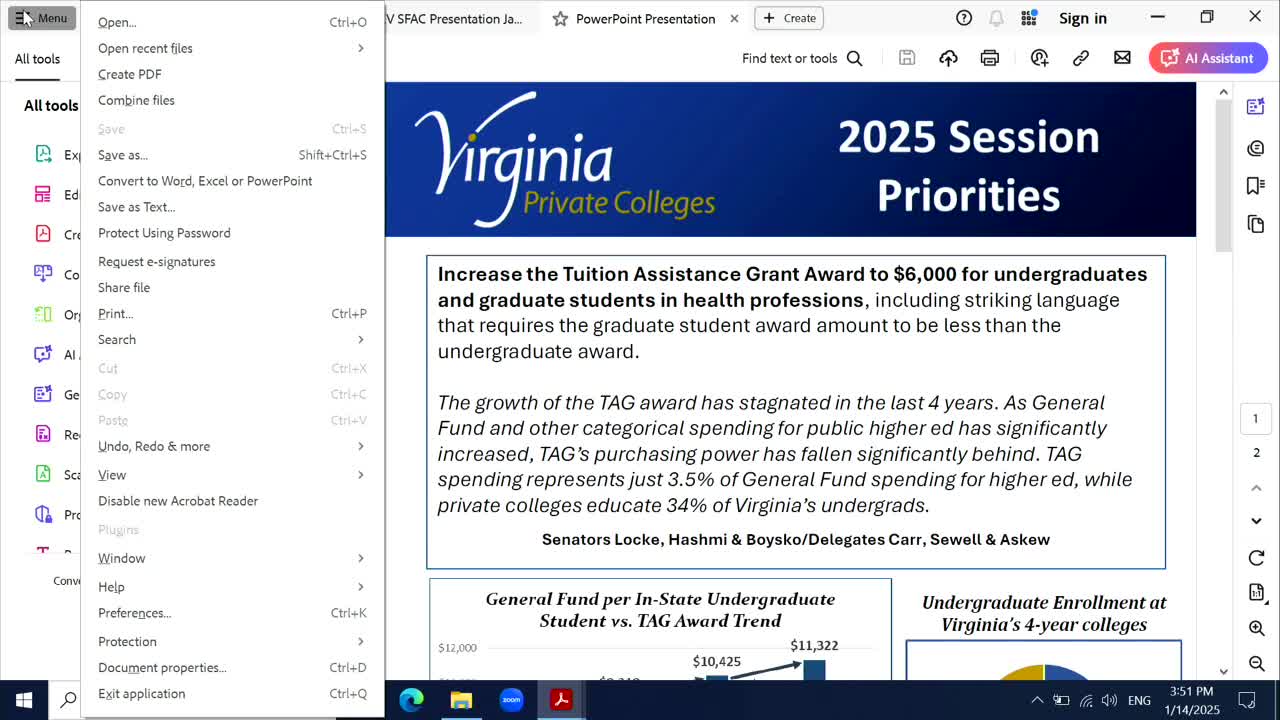Council of Independent Colleges urges $6,000 TAG, nursing and mental‑health investments to sustain nonprofit colleges
Get AI-powered insights, summaries, and transcripts
Subscribe
Summary
Leaders of Virginia’s Council of Independent Colleges (CICV) told a Senate subcommittee that private nonprofit colleges enroll a high share of Pell‑eligible and first‑generation students and asked legislators to raise the Tuition Assistance Grant (TAG) to $6,000 and support nursing and mental‑health initiatives.
Mary Dana Hinton, president of Hollins University and chair of the Council of Independent Colleges in Virginia, and Frank Shuschak, president of Roanoke College and vice chair of CICV, told the Senate Finance and Appropriations Committee’s higher education subcommittee that Virginia’s 28 private nonprofit colleges are key access institutions and asked for sustained support for the Tuition Assistance Grant.
‘‘Investing in Virginia students is not only an investment in education, it's an investment in the Commonwealth's prosperity, workforce readiness, and community well‑being,’’ Frank Shuschak said, urging lawmakers to back a proposal to increase TAG to $6,000.
Shuschak described CICV colleges as serving a higher share of lower‑ and middle‑income, Pell‑eligible and first‑generation students than many public institutions. He told the committee that, collectively, the sector supports roughly 28,000 direct and indirect jobs, generates about $2.2 billion in wages and benefits, and contributes about $4.6 billion in total economic output.
CICV requested several specific actions in the 2025 General Assembly session: increase the Virginia Tuition Assistance Grant to $6,000, restore parity between undergraduate and graduate TAG increases, create a nursing workforce center and degree‑and‑incentive programs, allow nonprofit colleges to access the CHEV‑run mental‑health workforce pilot or a statewide virtual student mental‑health contract, and recognize nonprofit campus police under the Line of Duty Act.
Mary Dana Hinton emphasized the sector’s role in access and workforce development, noting that many CICV institutions enroll high percentages of Pell‑eligible and first‑generation students. ‘‘We serve as access institutions for lower and middle income students and first‑generation students with a large percentage of Pell eligible students,’’ she said.
Shuschak outlined challenges facing the nonprofit sector since the 2024 budget: a modest enrollment drop (he said a 1% decline last fall), executive retirements, rising operational costs, regulatory reporting burdens, FAFSA‑related enrollment disruption, and public debate over the value and affordability of college degrees. He said TAG, combined with institutional scholarships and federal aid, often makes private college costs comparable to public peers for many students.
The presenters asked senators to consider the budget amendments and priorities they provided and offered to meet individually with members. The subcommittee did not take action during the meeting.
